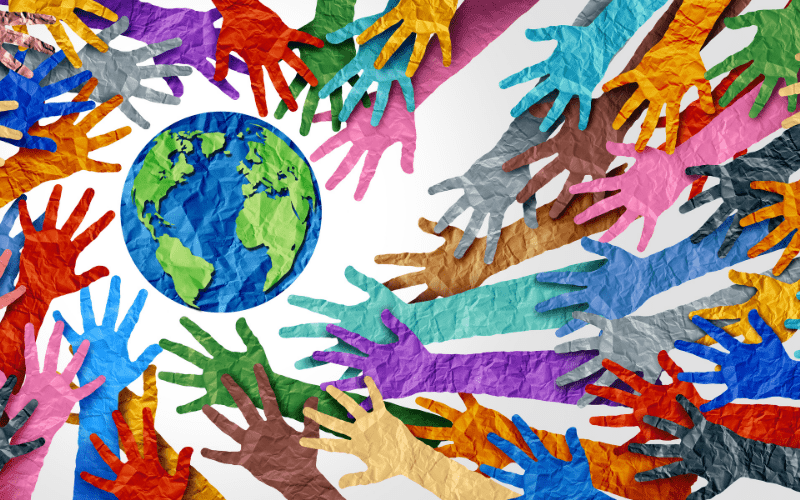“Community Cultural Wealth” is a framework to recognize and value the cultural assets and strengths of marginalized communities. Cultural Wealth as defined by Yosso (2005, p. 77) is the “array of knowledge, skills, abilities, and contacts possessed and utilized by Communities of Color to survive and resist macro-and-micro forms of oppression.”
How can EMDR therapists celebrate Community Cultural Wealth for Native American Heritage Month?
EMDR therapists can celebrate Native American Heritage Month by intentionally using the lens of Community Cultural Wealth to identify internal and external resources in their clients. We asked EMDRIA members for video or written responses for the following:
“Describe some internal and external resources that you strengthen/install with your Native American clients. How do you embrace Community Cultural Wealth?”
*** Amy Orlovich, LCPC-S As a registered member of the Cherokee Nation, I find it essential to remember the past and where we have come from, as well as have hope for the future. I have contributed to this effort by writing a therapeutic children’s book highlighting the Cherokee Nation and language and the work being done by the Intertribal Buffalo Council by re-establishing herds of bison onto tribal lands. The importance of this book is recognizing the importance of the bison and how it shows us to face challenges head-on, as well as how it is a symbol of strength to many indigenous peoples. “Wilson the Wombat Bravely Charges the Storm” is the title of this book in my Wilson the Wombat children’s book series. ***Shelley Spear Chief *For closed captioning, play the video and click on the ‘CC’ icon in the lower right-hand corner. *** Elizabeth Warson, PhD, LPC Using bilateral movement with feathers is a community cultural wealth resource I promote. This demonstration from the Colorado Art Therapy Association is with my Comanche father, Dr. James Warson, based on our collaborative work on bilateral movement and artmaking (EMDR Phase 2 intervention). This has also been a part of my work in many indigenous communities: Eastern Band Cherokee, Coharie Tribe, Minnesota Tribes, Lakota Tribes, and at intertribal conferences. I find this type of bilateral stimulation effective with the standard protocol as well and in combination with equine-assisted psychotherapy (EquiLateral protocol). In addition, we have written a father-daughter collaborative (2023) article titled “Bilateral Movement and Artmaking: Hemispheric Integration Across the Midline” in the Canadian Journal of Art Therapy: Research, Practice, and Issues. References EMDRIA. (2023). Celebrating Community Cultural Wealth. Focal Point Blog. https://www.emdria.org/blog/celebrating-community-cultural-wealth/ EMDRIA. Diversity and Cultural Competence Association Policy. EMDRIA. (2022). EMDRIA Members Respond: How Can EMDR Therapists Increase Safety for BIPOC Clients? Focal Point Blog. https://www.emdria.org/public-resources/bipoc-mental-health/ EMDRIA. (2022). EMDRIA Members Respond: How Can the Field of EMDR Therapy Increase Access of Care for BIPOC Individuals? Focal Point Blog. https://www.emdria.org/public-resources/emdria-members-respond-how-can-the-field-of-emdr-therapy-increase-access-of-care-for-bipoc-individuals/ EMDRIA (2022). EMDRIA Members REspond: Identity and Heritage Representation for Native American Heritage Month. Focal Point Blog. https://www.emdria.org/blog/emdria-members-respond-identity-and-heritage-representation-for-native-american-heritage-month/ EMDRIA. EMDR and Diversity, Community, and Culture Online Community. EMDRIA. Race, Culture, and Ethnicity OnDemand Education Opportunities. https://www.emdria.org/emdr-training/continuing-education/emdria-on-demand/?fwp_practice_methods=dei-idea Levis, R. V. (2017). Placing Culture at the Heart of EMDR Therapy. In Nickerson, M. I. (Ed.), Cultural Competence and Healing Culturally-Based Trauma with EMDR Therapy: Innovative Strategies and Protocols (pp. 97-112). New York, NY: Springer Publishing Co. Levis, R. V., & Siniego, L. B. (2017). An Integrative Framework for EMDR Therapy as an Anti-Oppression Endeavor. In Nickerson, M. I. (Ed.), Cultural Competence and Healing Culturally Based Trauma with EMDR Therapy: Innovative Strategies and Protocols (pp. 79-96). New York, NY: Springer Publishing Co. Yosso, T. J. (2005). Whose culture has capital? A critical race theory discussion of community cultural wealth. Race, Ethnicity, and Education, 8(1), 69-91. https://doi.org/10.1080/1361332052000341006Back to Focal Point Blog Homepage
Resources
- Let’s Talk EMDR podcast, “EMDR Therapy with Native Americans/First Nations People” – Series 1, Episode 4
- American Bar Association. Human Rights: Native Americans: A crisis in health equity. www.americanbar.org/groups/crsj/publications/human_rights_magazine_home/the-state-of-healthcare-in-the-united-states/native-american-crisis-in-health-equity/
- Anti-racism Daily. Unpack “This Land is Your Land.” https://the-ard.com/2021/01/25/unpack-this-land-anti-racism-daily/
- Child Welfare Information Gateway. Mental Health and American Indian and Alaska Native Communities. www.childwelfare.gov/topics/systemwide/diverse-populations/americanindian/mentalhealth/mentalhealth-communities/
- GLSEN. Erasure and Resilience: The Experiences of LGBTQ Students of Color, Native and Indigenous LGBTQ Youth in U.S. Schools. www.glsen.org/research/native-and-indigenous-lgbtq-students
- Indian Health Service. https://www.ihs.gov/
- Indigenous Language Institute. https://ilinative.org/
- Indigenous Story Studio. Illustrations, posters, videos, and comic books for indigenous youth. https://istorystudio.com/
- Library of Congress Archive. Native American History. https://blogs.loc.gov/teachers/category/native-american-history/
- Mental Health America. Native and Indigenous Communities and Mental Health. www.mhanational.org/issues/native-and-indigenous-communities-and-mental-health
- National Alliance on Mental Illness (NAMI). Podcast: Hope Starts with Us. “Indigenous Mental Health & Well-Being” – Episode 9. www.podbean.com/media/share/dir-62dq3-15b0120b?utm_campaign=i_share_ep&utm_medium=dlink&utm_source=i_share
- National Alliance on Mental Illness (NAMI). Indigenous. www.nami.org/Your-Journey/Identity-and-Cultural-Dimensions/Indigenous
- National Congress of American Indians. Cultural Protection & NAGPRA. www.ncai.org/policy-issues/community-and-culture/cultural-protection-and-nagpra
- National Endowment for the Humanities. Not “Indians,” Many Tribes: Native American Diversity. https://edsitement.neh.gov/lesson-plans/not-indians-many-tribes-native-american-diversity
- National Indian Health Board. https://www.nihb.org/behavioral_health/resources.php
- Native Land Digital Map. https://native-land.ca/
- NPAIHB Indian Leadership for Indian Health. Two Spirit and LGBTQ Health. http://www.npaihb.org/2slgbtq/#
- Project 562. Contemporary Native American documentation. www.project562.com/about
- Substance Abuse and Mental Health Services Administration (SAMHSA). Cultural card: A guide to build cultural awareness, American Indian and Alaska Native. www.samhsa.gov/resource/dbhis/culture-card-guide-build-cultural-awareness-american-indian-alaska-native
- Substance Abuse and Mental Health Services Administration (SAMHSA). Tribal affairs and policy. https://www.samhsa.gov/tribal-affairs
- Stronghearts Native Helpline. 24/7 Safe, Confidential and Anonymous Domestic, Dating and Sexual Violence Helpline for American Indians and Alaska Natives. https://strongheartshelpline.org/
- United States Census Bureau. Improved Race and Ethnicity Measures Reveal U.S. Population is Much More Multiracial. www.census.gov/library/stories/2021/08/improved-race-ethnicity-measures-reveal-united-states-population-much-more-multiracial.html
- Urban Indian Health Insitute. Decolonizing data for Indigenous people, by Indigenous people. www.uihi.org/
- WeRNative. For Native Youth, By Native Youth. www.wernative.org/
Additional Resources
If you are a therapist interested in the EMDR training:- Learn more about EMDR at the EMDRIA Library
- Learn more about EMDR Training
- Search for an EMDR Training Provider
- Check out our EMDR Training FAQ
Date
November 10, 2023
Client Population
Racial/Cultural/Ethnic Groups
Practice & Methods
DEI/IDEA, Resourcing





